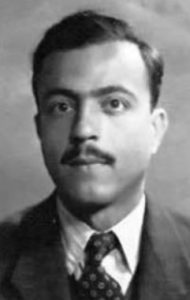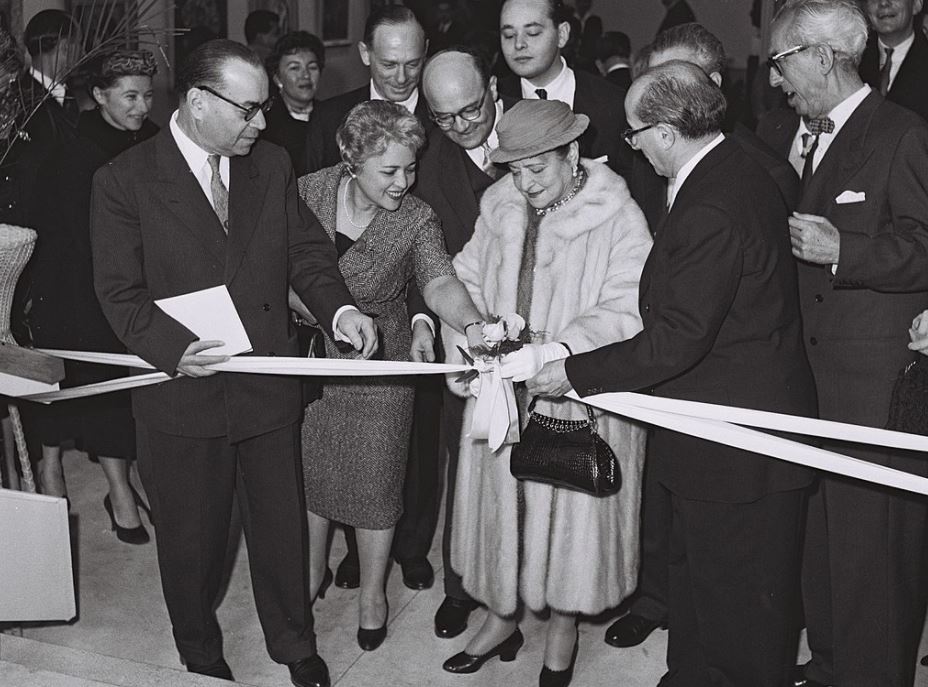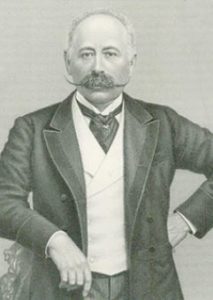Father of Israeli Espionage
 Gamliel Jamil Cohen (1922-2002) was born in Damascus to a religious Syrian-Jewish family, and grew up in the city’s Jewish Quarter. Yearning to live in the Holy Land and inspired by the Zionist vision, he left Damascus at the age of 21 and literally walked to Israel. He joined a kibbutz started by Ashkenazi immigrants. Despite being the odd one who was darker-skinned and spoke no Yiddish, Cohen quickly fell in love with the sense of unity and brotherhood, as well as the important pioneering work of developing the Jewish ancestral homeland. His uniqueness caught the attention of the Palmach, the commando unit of the pre-IDF defence force, the Haganah. The Palmach sought to launch an intelligence unit that could infiltrate Arab governments, and were looking for talented and dedicated Arab Jews. In 1944, Cohen became their first recruit. Together with Iraqi Jew Shimon Somech, they created the first unit of Mista’arvim (recently popularized by the show Fauda). The term itself came from the name of the ancient Mizrachi Jewish communities living in Arab lands that were distinct from, and pre-dated, the Sephardic Jews that joined them after the Spanish Expulsion of 1492. After several years of training, Cohen moved to Beirut in 1948 and set up Israel’s first official intelligence outpost, living undercover as Yussef el-Hamed, a textile shop owner. By this point, his operation was overseen by the newly-formed Mossad. Cohen’s trailblazing work and espionage innovations paved the way for more famous later spies like Shula Cohen and Eli Cohen. In 1954, Cohen married a fellow Syrian Jew who also worked for the Mossad. Together, they moved to Paris undercover as Arabic journalists. Cohen managed to get hired by the Syrian Embassy in Paris, from which he sent critical intelligence to the Israeli government. In 1958, the Cohens moved to Vienna to continue their work as “journalists”. In addition to infiltrating the embassies of Arab states, they also found information on neo-Nazi groups and exposed war criminals in hiding. Cohen retired from active duty in 1964 and went on to train the next generation of Israeli spies. In his last years, he wrote the book Undercover: The Untold Story of the Palmach’s Clandestine Arab Unit. Almost all of Cohen’s work remains classified. He has been called the “father of Israeli espionage”.
Gamliel Jamil Cohen (1922-2002) was born in Damascus to a religious Syrian-Jewish family, and grew up in the city’s Jewish Quarter. Yearning to live in the Holy Land and inspired by the Zionist vision, he left Damascus at the age of 21 and literally walked to Israel. He joined a kibbutz started by Ashkenazi immigrants. Despite being the odd one who was darker-skinned and spoke no Yiddish, Cohen quickly fell in love with the sense of unity and brotherhood, as well as the important pioneering work of developing the Jewish ancestral homeland. His uniqueness caught the attention of the Palmach, the commando unit of the pre-IDF defence force, the Haganah. The Palmach sought to launch an intelligence unit that could infiltrate Arab governments, and were looking for talented and dedicated Arab Jews. In 1944, Cohen became their first recruit. Together with Iraqi Jew Shimon Somech, they created the first unit of Mista’arvim (recently popularized by the show Fauda). The term itself came from the name of the ancient Mizrachi Jewish communities living in Arab lands that were distinct from, and pre-dated, the Sephardic Jews that joined them after the Spanish Expulsion of 1492. After several years of training, Cohen moved to Beirut in 1948 and set up Israel’s first official intelligence outpost, living undercover as Yussef el-Hamed, a textile shop owner. By this point, his operation was overseen by the newly-formed Mossad. Cohen’s trailblazing work and espionage innovations paved the way for more famous later spies like Shula Cohen and Eli Cohen. In 1954, Cohen married a fellow Syrian Jew who also worked for the Mossad. Together, they moved to Paris undercover as Arabic journalists. Cohen managed to get hired by the Syrian Embassy in Paris, from which he sent critical intelligence to the Israeli government. In 1958, the Cohens moved to Vienna to continue their work as “journalists”. In addition to infiltrating the embassies of Arab states, they also found information on neo-Nazi groups and exposed war criminals in hiding. Cohen retired from active duty in 1964 and went on to train the next generation of Israeli spies. In his last years, he wrote the book Undercover: The Untold Story of the Palmach’s Clandestine Arab Unit. Almost all of Cohen’s work remains classified. He has been called the “father of Israeli espionage”.
Happy Israel Independence Day!
Words of the Week
The U.N. did not create Israel. The Jewish state came into being because the Jewish community in what was Mandatory Palestine rebelled against foreign imperialist rule. We did not conquer a foreign land.
– Yitzhak Shamir

 Chaya Helena Rubinstein (1872-1965) was born in the Jewish ghetto of Krakow, Poland, the oldest of eight daughters in a very religious family. Her cousin was
Chaya Helena Rubinstein (1872-1965) was born in the Jewish ghetto of Krakow, Poland, the oldest of eight daughters in a very religious family. Her cousin was 
 Moritz Tzvi von Hirsch auf Gereuth (1831-1896) was born in Munich to a wealthy German-Jewish family. His grandfather was a banker for the Bavarian king, and became the first Jew to be permitted to own land in Bavaria. His father also served as the court banker, and became a German baron. Hirsch studied in Brussels, then took a banking job himself at age 17. Years later, he branched off on his own, eventually making his fortune from sugar, copper, and railroads. One of his boldest projects was building a Vienna-to-Istanbul rail line. Hirsch settled in Paris where he lived for the remainder of his life, going by the French version of his name, Maurice de Hirsch. In 1860, the Alliance Israélite Universelle (Kol Israel Haverim) organization was founded in Paris to secure human rights and education for Jews around the world. Hirsch became their biggest supporter, essentially bankrolling their operation to the tune of several hundred thousand pounds a year. The organization was most famous for building Jewish schools, including the first schools in pre-State Israel. The Alliance schools were also the first to teach a Hebrew curriculum, playing a key role in the language’s revival. Hirsch also donated countless sums to schools and hospitals across Germany, France, and England. He paid for the renowned Pasteur Institute’s entire biochemistry building. In the last two decades of his life, Hirsch was devoted to easing the plight of Russian Jews. He founded the Jewish Colonization Association in 1891 with a starting budget of £2 million pounds. The money was used to resettle Eastern European Jews in the Americas (particularly in Canada and Argentina), as well as in Ottoman Palestine. Altogether, Hirsch donated £18 million to the organization, the equivalent of about $4 billion today! Needless to say, it played a massive role in getting the Zionist movement off the ground and re-establishing a Jewish state in Israel (though de Hirsch himself didn’t believe it would ever actually happen!) as well as saving countless lives from pogroms and oppression. Maurice de Hirsch is ranked among the most generous philanthropists of all time. His wife, Clara de Hirsch, is also on this list, in her own right. She came from a wealthy banking family, too, and donated another 200 million francs of her own funds. When the couple tragically lost their only son in 1887, Maurice de Hirsch declared: “My son I have lost, but not my heir; humanity is my heir.” For his efforts to launch a mass-exodus and liberation of Jews, he has been called the “Moses of the 19th Century”.
Moritz Tzvi von Hirsch auf Gereuth (1831-1896) was born in Munich to a wealthy German-Jewish family. His grandfather was a banker for the Bavarian king, and became the first Jew to be permitted to own land in Bavaria. His father also served as the court banker, and became a German baron. Hirsch studied in Brussels, then took a banking job himself at age 17. Years later, he branched off on his own, eventually making his fortune from sugar, copper, and railroads. One of his boldest projects was building a Vienna-to-Istanbul rail line. Hirsch settled in Paris where he lived for the remainder of his life, going by the French version of his name, Maurice de Hirsch. In 1860, the Alliance Israélite Universelle (Kol Israel Haverim) organization was founded in Paris to secure human rights and education for Jews around the world. Hirsch became their biggest supporter, essentially bankrolling their operation to the tune of several hundred thousand pounds a year. The organization was most famous for building Jewish schools, including the first schools in pre-State Israel. The Alliance schools were also the first to teach a Hebrew curriculum, playing a key role in the language’s revival. Hirsch also donated countless sums to schools and hospitals across Germany, France, and England. He paid for the renowned Pasteur Institute’s entire biochemistry building. In the last two decades of his life, Hirsch was devoted to easing the plight of Russian Jews. He founded the Jewish Colonization Association in 1891 with a starting budget of £2 million pounds. The money was used to resettle Eastern European Jews in the Americas (particularly in Canada and Argentina), as well as in Ottoman Palestine. Altogether, Hirsch donated £18 million to the organization, the equivalent of about $4 billion today! Needless to say, it played a massive role in getting the Zionist movement off the ground and re-establishing a Jewish state in Israel (though de Hirsch himself didn’t believe it would ever actually happen!) as well as saving countless lives from pogroms and oppression. Maurice de Hirsch is ranked among the most generous philanthropists of all time. His wife, Clara de Hirsch, is also on this list, in her own right. She came from a wealthy banking family, too, and donated another 200 million francs of her own funds. When the couple tragically lost their only son in 1887, Maurice de Hirsch declared: “My son I have lost, but not my heir; humanity is my heir.” For his efforts to launch a mass-exodus and liberation of Jews, he has been called the “Moses of the 19th Century”.